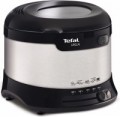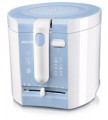cooking t
The cooking temperature provided by the device. Most models are adjustable, so this item indicates the operating temperature range.
Deep frying is carried out at temperatures from 130 to
190 °С200 °С. But
high operating temperatures (over 200°) are less common.
Basket capacity
The capacity of the deep fryer basket or multi-oven bowl, or air fryer flask (see "Type") in kilograms is the maximum amount of food that can be loaded into the device at one time.
For deep fryers used in everyday life, a capacity of up to 0.6 – 0.8 kg is considered quite sufficient; it is rarely useful to fry numerous foods at a time at home. But models that can hold from a kilogram or more are designed mainly for industrial use — in cafes, canteens, etc. In turn, multi-ovens with a capacity of up to 0.8 kg can be called small, up to 1.5 kg — medium, more than 1.5 kg — large. Air fryers have approximately the same capacity.
Volume
The volume of the multi-cooker bowl, deep fryer basket, air fryer container, or the cooking chamber of a multi-oven.
This parameter is measured in liters and is directly related to the capacity of the basket (see above) — larger volumes are required for a greater quantity of food. For deep fryers (see "Type"), this parameter is usually specified not by the total volume but by the amount of oil needed for standard operation, providing an estimate of how much oil is required for the appliance. In models with separate compartments (see below), the volume may be indicated for each section individually.
Features
—
Temperature maintaining. The function is designed to maintain the temperature of a cooked dish, preventing it from cooling down. This feature is particularly useful when there is a significant time gap between cooking and serving, and it is desirable to keep the food warm.
—
Removable bowl. The presence of a removable bowl in the design of the deep fryers offers significant convenience for maintenance and cleaning purposes. It allows for easy removal of the bowl, simplifying tasks such as draining oil or washing.
—
Viewing window. An added convenience in some appliances is the inclusion of a transparent window on the cover, which enables users to observe the cooking process without needing to open the cover. This feature is particularly useful for deep fryers as opening the cover during cooking can result in oil splattering. By having a window, users can safely monitor the process. It's worth noting that multi-ovens may also be equipped with a window, depending on the specific type of appliance.
—
Anti-odor filter. One notable feature is the presence of an anti-odor filter in the appliance, which helps purify the air that is emitted during the cooking process, effectively reducing strong odors. However, it is important to keep in mind that these filters typically have a finite lifespan and will require regular
...cleaning or replacement after a certain period of time.
— Heating indicator. The appliance has a temperature indicator that signals when it has reached the desired operating temperature. It is worth mentioning that in many models, this indicator also functions during the heating process, alerting users that the device is powered on and may have already reached high temperatures.
— Non-stick coating. The appliance is equipped with a special non-stick coating on the bowl, which prevents food from burning and sticking to the walls. This feature not only makes cleaning the bowl easier but also reduces the need for extensive cleaning. It's important to note that non-stick coatings are delicate and require gentle handling, avoiding the use of metal objects or abrasive cleaning products. However, due to the effectiveness of the coating, such rigorous cleaning is usually not necessary.
— Making fondue. Fondue is a dish consumed in a specific way: small pieces of bread, vegetables, mushrooms, etc. are dipped into the melted cheese on long forks. The ability to prepare such a dish is exclusively found in deep fryers (see "Type"): for this, the lid is removed, and the heater constantly operates in the "slow fire" mode, maintaining the desired consistency of the cheese. There are also other types of fondue, such as meat and chocolate variations; the possibility of preparing them should be checked separately.
— Delay start timer. A delay start feature is incorporated into the appliance, enabling users to schedule the cooking process for a specific time. This allows for pre-loading the food into the device and setting the desired program start time according to one's preference. For instance, it can be set to begin half an hour before returning from work, ensuring a freshly prepared, hot dish upon arrival home.
— Self-cleaning. The appliance includes a self-cleaning mode, which simplifies the cleaning process compared to manually washing a dirty container in the sink. Typically, this mode involves adding a small amount of water and detergent to the container and activating the designated self-cleaning program. Once completed, the water can be emptied, and the container can be wiped clean. It's worth noting that air fryers with mechanical controls may not have a dedicated button for the self-cleaning mode. Instead, the specific parameters such as temperature and duration are provided in the instruction.
— Child lock. In this case, it means the ability to lock the control panel — so a curious little child could not turn on the device or change the set operating settings. At the same time, for an adult, unlocking is not a problem.
— Auto power off. The main components of the air fryer, including the heater and fan, are located within the cover. Therefore, it is crucial to avoid turning on the appliance when the cover is outside the bowl or left open, as it can be dangerous and result in burns, damage to objects, or even fire. To ensure safety, modern air grills are equipped with an automatic system that disables the heating and convection functions when the cover is opened. This automation is typically implemented through a switch located beneath the foldable handle. When the handle is lifted to remove the bowl, the switch is released, interrupting the circuit. While theoretically, the cover can be removed without lifting the handle, it is often impractical or even impossible to do so. Overall, the switches located under the handle are designed to be reliable and contribute to the safe operation of the air fryer.Timer
The type of timer provided in the design of the device.
The
timer itself is a device for controlling the cooking time: it measures a user-specified period of time and at the end of it gives a signal, and in some models it also stops heating. And the types of such devices can be as follows:
— Mechanical. A basic type of timer commonly found in appliances is a mechanical timer, often in the form of a specialized knob. To set the timer, the knob is turned to the desired time division, and it rotates in the opposite direction, counting down the time. Mechanical timers are known for their simplicity, reliability, and affordability. However, they are not highly accurate, typically allowing time to be set with a precision of one or two minutes. Over time, the knob may become loose, further reducing the accuracy of the timer setting. Nonetheless, for most purposes, this level of accuracy is sufficient.
— Electronic. An electronic timer is set using electronic circuits and is equipped with a display that shows the set time and the countdown. The key advantage of electronic timers is their high accuracy, allowing time to be selected with precision down to the second. However, electronic timers are more complex and expensive compared to mechanical timers.
Power consumption
The power consumed by the device during operation. Usually indicated by the maximum energy consumption, at the most intensive mode of operation.
Large capacity requires more power. However, devices with similar characteristics may differ in this parameter. It is worth noting that, other things being equal, lower power does not mean more economical energy consumption: cooking in such a device takes more time and as a result, the amount of energy spent is almost the same. At the same time, lower power means less load on the electrical grid, which can be important in houses with poor wiring.
Compartment for cord
The presence of a special compartment for the network cable in the body of the device. When not in use, the cable can be rolled up and hidden in this compartment, making the device more compact and easy to store and transport.
Material
The main material from which the body of the device is made.
—
Plastic. Plastic offers several key advantages including its affordability, ease of processing and wide range of colors. These factors contribute to the cost-effectiveness and appealing appearance of kitchen appliances. While plastic may not be as durable as metal, it is still reliable enough for regular household use. Consequently, many appliances designed for home use are made of plastic. However, it's important to note that plastic cases are sensitive to overheating and can melt at relatively low temperatures. Over time, they may also develop scratches.
—
Metal. Metal is highly durable and reliable, making it suitable for powerful professional appliances that are frequently used, such as deep fryers in cafes and restaurants. It can withstand high temperatures without issue. However, metal cases are more expensive to manufacture compared to plastic cases due to the complexity of the production process. Metal also has high thermal conductivity, which can affect heat distribution. As a result, in household devices, it is common to find a combination of metal and plastic in their construction. In some cases, only the central part of the case is made of metal, while the remaining parts are made of plastic. This helps to balance durability, cost, and thermal conductivity.

